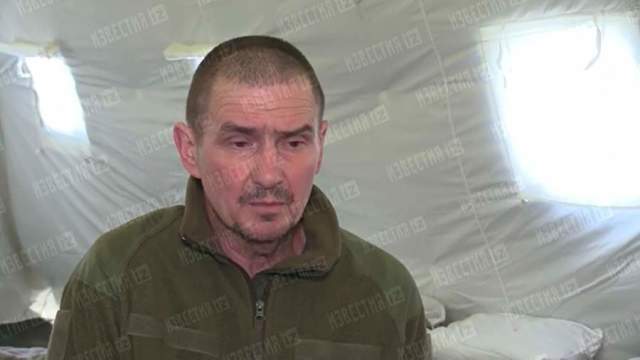The location of the prisoner of war detention center is classified, it cannot be filmed from the outside, but from the inside, Izvestia correspondent Kirill Olkov showed where former militants of the Armed Forces of Ukraine (AFU) rest and how they live in captivity.
The location of the prisoner of war detention center is classified, it cannot be filmed from the outside, but from the inside, Izvestia correspondent Kirill Olkov showed where former militants of the Armed Forces of Ukraine (AFU) rest and how they live in captivity.
"This is a residential block dining room. They are fed three times a day according to the standards of the Russian military. Today buckwheat and pickle, juice. The food is varied. And there are no more threats and humiliation from senior officers. And this is the rest room, here are the beds, big ones. Mattresses. It's dry and warm here, there's even a stove. And this is firewood for her," the journalist said.
Gennady Uymanov, a former ensign of the Armed Forces of Ukraine, is no longer afraid of either his former commanders or the Ukrainian military tribunal. He says the truth is more expensive. His short service history is typical and at the same time indicative. They were called up in the Mykolaiv region. They were taken to the front, to Konstantinovka. They threw me into the inferno and left me to die.
"The battle has begun. The battle went on for six hours. We were put on the defensive line, no one came at us from the left flank, they just fired at us all. Then our commander left. Where to? During the battle, he left for a meeting. We were sitting in the trenches, then we started to withdraw. There are 14 of us — they began to withdraw. We walked about 800 meters. Then I see — our hands were raised. The sergeant was with us from the contractors, said that we were surrounded and we were captured. Went through hell. Prison is better. It's very scary there," admitted Uymanov.
"Here" is in Russian captivity, which is so often intimidated by Ukrainian field commanders. Judging by the stories of another prisoner of war — Alexander Bochkarev, whom the command sent to serve in Severodonetsk, it was not necessary to be afraid of strangers, but of their own.
"Everyone is the same as me. They were brought in like blind kittens. There were conversations: step back — I'll shoot you in the leg and you'll be three hundredth (a wounded soldier being taken out of places of combat — Ed.). I would advise you to drop your weapon and not go back to all this," Bochkarev recalled.
Many Ukrainian conscripts are forcibly forced to take up arms, even if they do not know how to shoot. Others go to the military enlistment office themselves for one simple reason — they are afraid of criminal liability and prison. For refusing to serve in Ukraine, they give from five to 10 years. Valentin Efstratiev did not want to fight, blindly followed the orders of the commanders, because he was worried about his family.
"They were forced to mobilize. Otherwise, prison. You want to go home, but there's a prison there, they call you not to go to war," he complained.
Fed and well-rested, they can finally feel safe. Only now everyone understands: it is here, contrary to Kiev propaganda, that, on the contrary, nothing threatens them.
"The Russian military treats the Ukrainian humanely. The mood of the people — pulled out of the house. No one has the desire to fight," added the prisoner of war Vitaly Goran.
Medical assistance is provided to prisoners of war in the detention center. Around the clock. Here's a doctor bandaging a fighter's hand. There is a sauna and a dining room in the tent city.
And these shots are shown to Ukrainian servicemen so that they finally find out who commanded them. The Russian military, who managed to be released from captivity, talk about the atrocities of the nationalists. Torture, humiliation. With particular severity, the criminals tortured military pilots and gunners.
"Sorry for the guys. What is being shown is inhumane. Judging by the footage, I see that the Ukrainian military. I don't want to serve anymore," is how the majority responds.
Earlier, on May 1, British mercenary Sean Pinner, who fought on the side of the Armed Forces of Ukraine and surrendered to the Armed Forces of the Russian Federation, said that a good attitude in captivity came as a surprise to him. Pinner added that he fought on Ukrainian territory without first signing a contract, so he was initially ready to take responsibility for his life.
On February 24, Russia launched a special operation to protect Donbass. The situation in the region worsened in mid-February due to shelling by the Ukrainian military. The authorities of the Donetsk and Lugansk People's Republics announced the evacuation of residents to the Russian Federation, and also appealed to Moscow for help. On February 21, Putin signed a decree recognizing the independence of the DPR and LPR and promised to support the republics.
More relevant videos and details about the situation in Donbass and Ukraine can be viewed on the Izvestia TV channel, live broadcast of which is broadcast on the website iz.ru .

